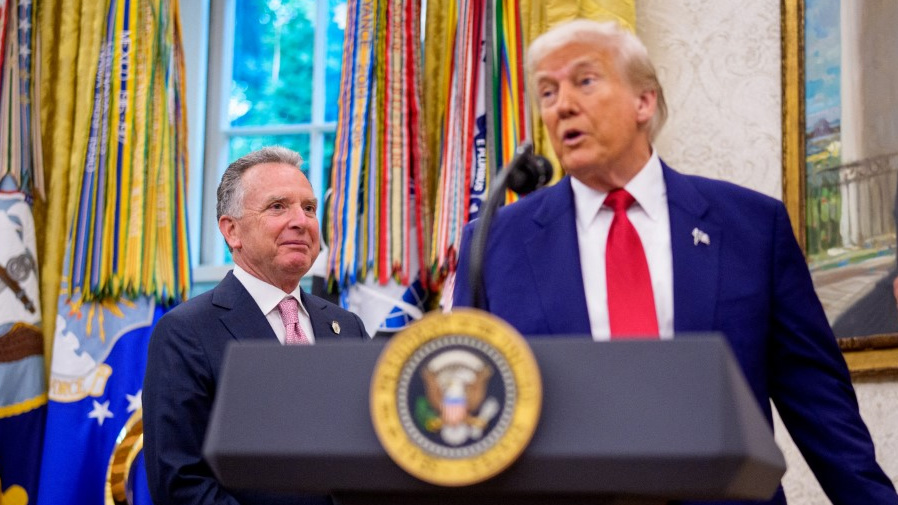The administration of US President Donald Trump appeared close to securing a ceasefire to end the Gaza war, halt the inhumane blockade imposed on its starving people, and ensure the release of all Israeli captives held by Hamas.
Indeed, a preliminary deal was reached in Doha between Hamas and the US administration’s interlocutor, Palestinian American Bishara Bahbah. Acting on behalf of Middle East envoy Steve Witkoff, Bahbah, who headed an organisation that encouraged Arab Americans to vote for Trump in the last election, had been key to the previous negotiations that secured the release of American Israeli captive Edan Alexander.
Alexander’s release paved the way for the subsequent talks. According to an interview with Bahbah on Israel’s Channel 12, Witkoff initially suggested that Hamas should release Alexander as a “gesture of goodwill” towards Trump, who could then use “his influence for a ceasefire and to allow the aid to come into Gaza that is desperately needed by people”.
But soon after the preliminary ceasefire deal was struck, Witkoff changed course and came up with a modified plan that was accepted by the Israelis, thus tossing the ball back into Hamas’s court.
Clearly, Witkoff could not persuade the Israelis to accept what had been agreed with Hamas in Doha, instead adopting as his own Israel’s counterproposal – which, to Hamas, seemed nothing short of capitulation.
New MEE newsletter: Jerusalem Dispatch
Sign up to get the latest insights and analysis on
Israel-Palestine, alongside Turkey Unpacked and other MEE newsletters
The Israelis and their US backers might have concluded that after many months of war, Hamas had been severely battered and was too weak to reject the proposal. This is not the first time they’ve been proven wrong.
The Americans took the right step by opting to negotiate directly with Hamas. Earlier this year, the first direct talks were led by Trump’s hostage envoy, Adam Boehler, who was so confident about his mandate that he publicly responded to Israeli criticism by saying: “We’re not an agent of Israel.”
Talking to ‘terrorists’
This was all promising. The cliched notion that “we don’t talk to terrorists” has proven to be little more than a pretext to avoid the responsibility to engage fairly and honestly with all parties.
Since the time of former President Bill Clinton, all US administrations, both Democratic and Republican, have continued designating Hamas as a terrorist organisation. European nations, including the UK, followed suit.
This is despite the fact that Hamas was democratically elected by the Palestinian people in free and fair elections.
Follow Middle East Eye’s live coverage of the Israel-Palestine war
Colonial and oppressive powers have always tended to designate those who resist their tyranny and hegemony as terrorists who should not be spoken with. South Africa’s ruling African National Congress (ANC) was once designated a terrorist organisation by the US and UK, with former British Prime Minister Margaret Thatcher vowing never to meet its leader.
Just a few years later, ANC leader Nelson Mandela was elected head of state in his country, and was subsequently given a hero’s welcome when he visited the UK.

War on Gaza: Why forcing Hamas to disarm will not end Israel’s genocide
Read More »
Indeed, the adage that “terrorists” should not be spoken with has not held up across history. The Viet Cong, considered by the US to be terrorists, eventually sat around the same negotiating table with the Americans in Paris. More recently, the Taliban, who now rule Afghanistan, have held talks with the US in Doha.
Interestingly, in both cases, it was not negotiations that ended the conflicts, but the humiliating defeat and withdrawal of American troops.
When Trump authorised direct talks with Hamas, it was seen as a step in the right direction. Many observers thought it indicated that Trump was serious about stopping the war. Subsequent developments, however, have dashed these hopes and infuriated some of Washington’s regional Arab allies.
In short, the Trump administration appears to have wasted a historic opportunity – a chance to play a more constructive and less biased role in the Middle East. Trump himself has stated repeatedly that he wants to end wars.
Here was a real chance for his administration to show the world that it would no longer be a party to Israel’s genocide in Gaza and its war crimes across occupied Palestine. Instead, Trump’s team once again revealed itself to be untrustworthy and incapable of controlling Israel, even as the latter relies almost entirely on US military, financial and diplomatic support.
What a missed opportunity.
The views expressed in this article belong to the author and do not necessarily reflect the editorial policy of Middle East Eye.

